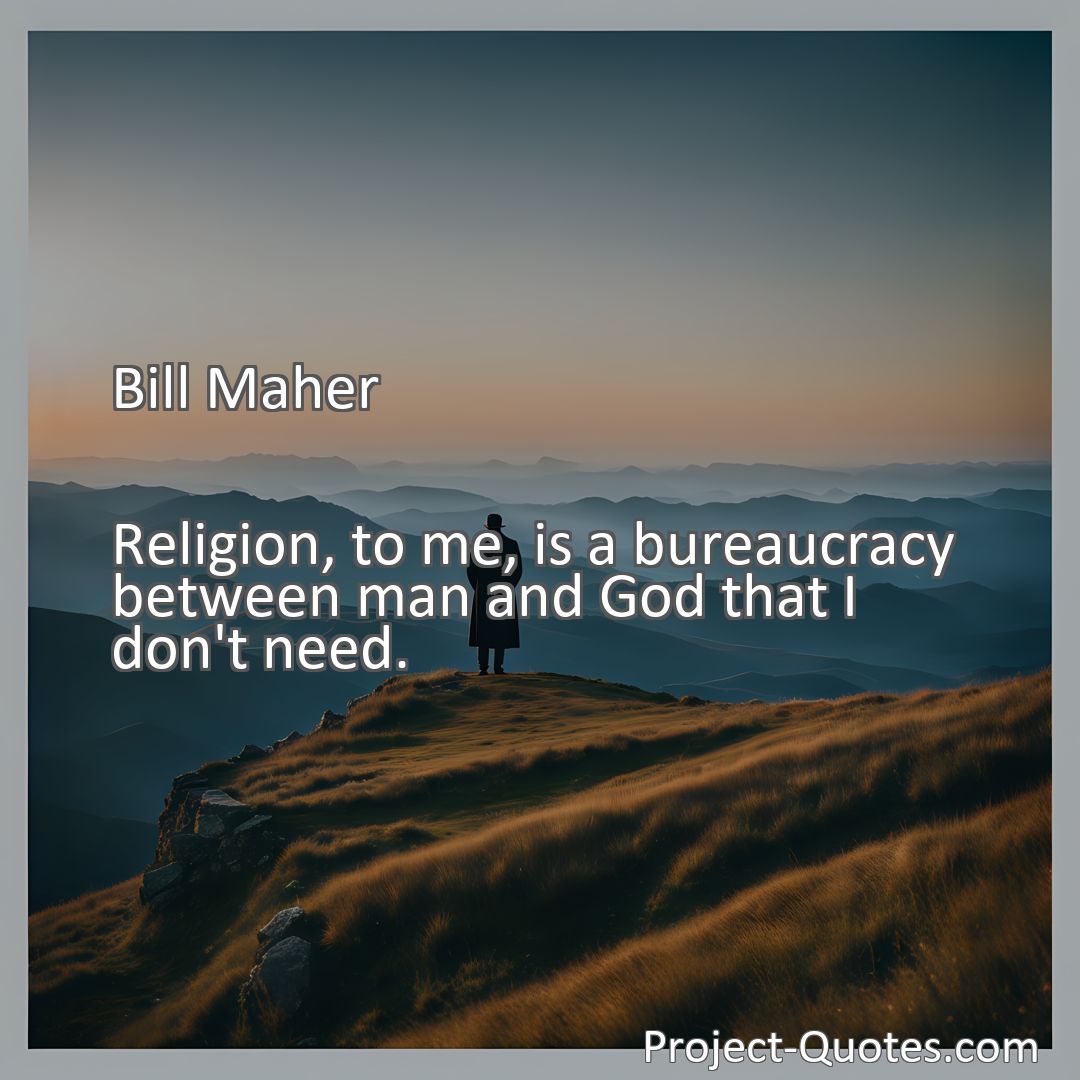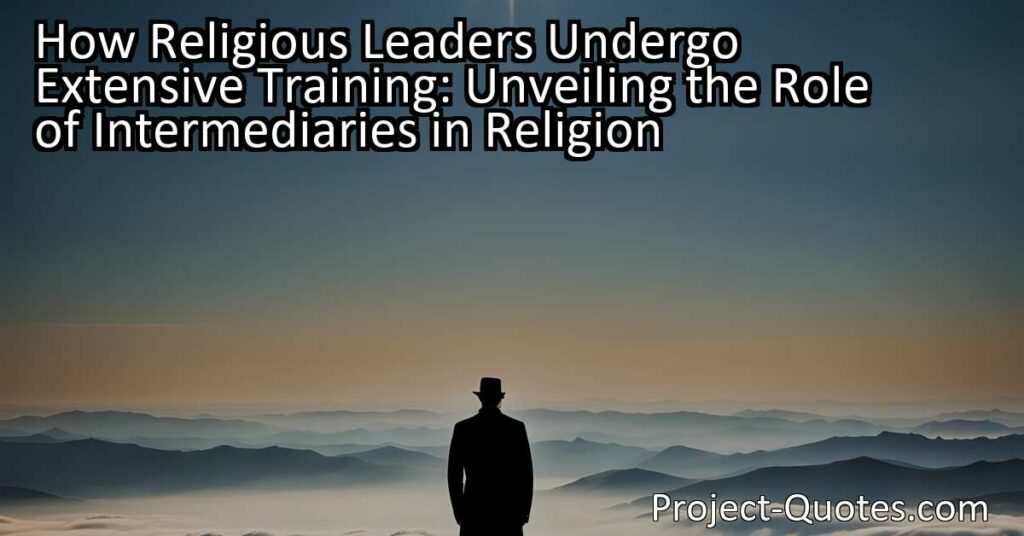Religion, to me, is a bureaucracy between man and God that I don’t need.
Bill Maher
Religious leaders often undergo extensive training to better understand their faith and offer guidance to others. Through their education and study, these leaders acquire knowledge, wisdom, and authority to interpret religious texts, provide moral guidance, and perform rituals. Their training enables them to assist individuals in navigating complex religious teachings, offer support during challenging times, and inspire spiritual growth.
Table of Contents
Meaning of Quote – Religion, to me, is a bureaucracy between man and God that I don’t need.
Religion, to me, is a bureaucracy between man and God that I don’t need. This statement implies a personal perspective on religion and suggests that the individual feels they can have a relationship with God without the need for religious institutions or organized practices. While this sentiment may resonate with some, it is essential to explore the multiple dimensions of religion, including its bureaucratic aspects, the significance of intermediaries, and the impact on personal beliefs and spirituality.
When discussing religion as a “bureaucracy,” we are referring to its organizational structure, rules, rituals, and hierarchies. Many religious institutions have established systems that govern their operations and guide believers in their faith. This bureaucracy often includes leaders, such as clergy or priests, who act as intermediaries between individuals and the divine.
While some people find solace and guidance within these structures, others may perceive them as unnecessary obstacles to their connection with God. They argue that they can cultivate their spirituality independently or through personal relationships with the divine. For them, religious institutions potentially impose unnecessary regulations and restrictions on their faith journey.
However, it’s important to acknowledge that a bureaucracy can also bring benefits to religious communities. It provides a framework for consistent practices, shared belief systems, and a sense of belonging among believers. The bureaucracy of religion often helps create a communal space for people to come together, worship collectively, and find support in times of need. Additionally, religious organizations frequently engage in charitable work, contributing to the well-being of society.
Another aspect highlighted in the quote is the notion of intermediaries between man and God. In many religions, individuals rely on clergy or other religious leaders to guide them in their spiritual quests. These individuals are thought to possess specific knowledge, wisdom, and authority to interpret religious texts, provide guidance, and perform rituals. However, some may feel that these intermediaries are unnecessary and can hinder a direct connection with God.
It is true that personal experiences of the divine can vary greatly, and many individuals find solace in personal, unmediated relationships with the divine. They may believe that each person has the ability to establish a direct connection with God, without the need for an intermediary. This perception is often associated with the belief that spirituality is a deeply personal and individual journey, where no external authority is required.
Moreover, some individuals who distance themselves from organized religion may reject the notion of intermediaries on the grounds that they introduce potential corruption or misinterpretation of religious teachings. By bypassing religious institutions and intermediaries, they feel they can have a purer and more authentic experience of their faith.
However, it is important to recognize that intermediaries can provide valuable guidance, support, and education. Religious leaders often undergo extensive training and study to better understand their faith and offer insights to others. They can assist individuals in navigating complex religious texts, offer moral guidance and emotional support during challenging times, and provide a sense of community. For many believers, intermediaries serve as mentors or role models who inspire and deepen their spiritual growth.
In the midst of discussing the bureaucracy and intermediaries, it is essential to acknowledge that the role of religion extends beyond these aspects. Religion encompasses a variety of rituals, practices, and beliefs that provide meaning and purpose to individuals and communities. It offers a moral framework, guiding believers in their ethical decision-making and shaping their values.
Religious communities often provide platforms for individuals to come together and engage in acts of worship, prayer, and reflection. These practices can foster a sense of transcendence, connecting believers with something beyond themselves. Whether through communal celebrations, prayer services, or solitary contemplation, these religious practices offer people the opportunity to find solace, seek forgiveness, express gratitude, and experience spiritual growth.
Furthermore, religion often plays a vital role in contributing to the fabric of society. Religious institutions frequently engage in charitable activities, advocating for justice, and addressing societal issues. They provide social services, such as housing initiatives, educational programs, healthcare facilities, and disaster relief efforts. These endeavors reflect the belief that religious teachings should extend beyond personal spiritual experiences and have a positive impact on the world.
In conclusion, the quote, “Religion, to me, is a bureaucracy between man and God that I don’t need,” encapsulates an individual perspective on religion. It highlights the perception that religious structures and intermediaries can often be seen as unnecessary and potentially hindering the direct connection between individuals and the divine. However, it is crucial to recognize that religion encompasses more than just bureaucracy and intermediaries. It offers a sense of belonging, shared values, ethical guidance, communal practices, and opportunities for personal and societal growth. Ultimately, the role of religion and the need for intermediaries are subjective and deeply personal, making the quote’s sentiment applicable to those who share a similar perspective.
I hope this quote inspired image brings you hope and peace. Share it with someone who needs it today!


